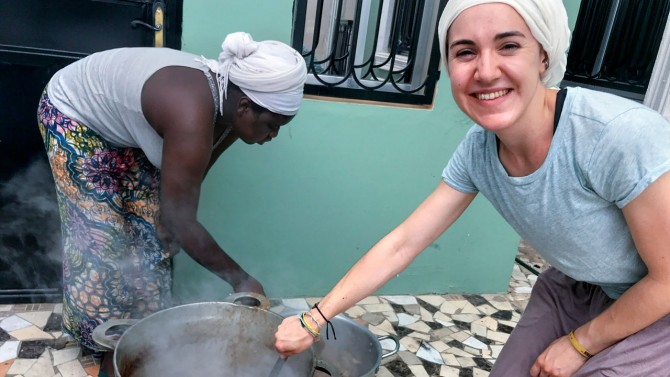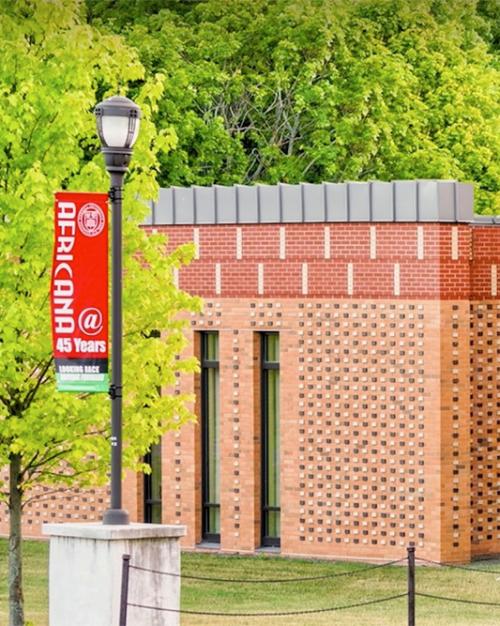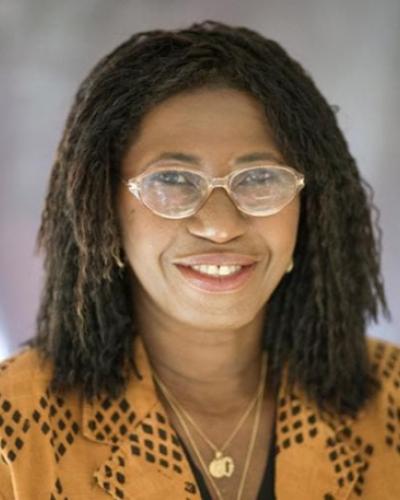The Institute for African Development (IAD), part of the Mario Einaudi Center for International Studies, has been awarded a three-year, $300,000 grant from the U.S. Department of Education to strengthen African studies and languages for Cornell undergraduates through programs on campus and in Africa.
Provided
Past IAD intern Elizabeth Heffern ’21 cooking traditional soup with her Gambian host sister.
The grant – received in partnership with Monroe Community College in Rochester, New York – will support the creation of “hubs” in Ghana and Zambia to anchor programming throughout the West African and Southern African regions, and ultimately the continent. The initiative includes support for undergraduates’ study-abroad programs and summer internships, enhanced by a network of Africa-based alumni mentors.
“This funding will give IAD the means to pursue, strengthen and expand upon our core educational objectives in African development studies,” said N’Dri Thérèse Assié-Lumumba, director of IAD and professor in the Africana Studies and Research Center in the College of Arts and Sciences.
“When students go to Africa for summer internships, they come back so enthusiastic. Some of them even change their educational careers based on that experience,” said Assié-Lumumba, who will teach one of two new classes in Africa as part of the program. “We think enabling more Cornell students to visit Africa will be a very important component in strengthening knowledge about Africa.”
Founded in 1987, IAD seeks to improve and expand African development studies through a multidisciplinary lens. The funding, from the Department of Education (DOE) Undergraduate International Studies and Foreign Languages Program, is the first major grant for IAD, which has expanded its reach in recent years with efforts including on-campus programming and summer internships abroad.
The Latin American Studies Program, also part of the Einaudi Center, received a similar grant from DOE in 2018.
“This project perfectly aligns with Cornell’s mission of educating global citizens and promoting a culture of broad inquiry,” said Rachel Beatty Riedl, Einaudi Center director, the John S. Knight Professor of International Studies and professor of government in A&S.
“Undergraduates will gain insights and partnerships that will last a lifetime,” Riedl said. “I know this from personal experience – conducting research in Senegal during my undergraduate years dramatically shaped not only my career, but also my approach to my community and my understanding of humanity.”
More than 400 mid-career professionals in 20 African countries have received advanced degrees from Cornell as IAD fellows in a range of disciplines. According to Jackie Sayegh, IAD’s program manager, the fellows are a valuable resource, offering numerous opportunities for connections, learning and research.
“These students, who have graduated from Cornell and returned home, now occupy positions of power in government and academia, and we’ve been able to work with them to strengthen our internship programs and research capacity,” Sayegh said.
“One of the things this funding allows is for us to extend the network of these IAD fellows all over Africa and strengthen their engagement with Cornell’s internationalization efforts,” said Heike Michelsen, associate director for assessment and grant writing at the Einaudi Center.
Though the enhanced programming in Africa was initially intended to begin in 2021, its timing will likely be reevaluated depending on the course of the COVID-19 pandemic, Michelsen said.
The partnership with Monroe Community College provides funds for faculty to conduct research in Africa, helping advance African studies at that institution as well as at Cornell.
Other highlights of the initiative include:
- development of two new faculty-led study-abroad courses in Ghana and Zambia;
- support for new summer internships or honors thesis research opportunities in Africa for undergraduates in humanities, social sciences and science fields;
- new basic African language and culture courses, particularly for science students who may not otherwise study a foreign language;
- new conversation hours for African languages;
- opportunities for undergraduates who have visited Africa to reflect on their experiences; and
- collaborative programming to engage undergraduates in discussion and awareness of current events.
“Especially due to COVID, international studies have become even more crucial in terms of understanding the world, seeing how interdependent the world is and how we need to actually work together,” said Muna Ndulo, the William Nelson Cromwell Professor of International and Comparative Law at the Law School and former director of IAD, where he was initially the grant’s principal investigator.
“The only way you can work together is to have a good understanding of the cultures of other countries, the systems of other countries,” Ndulo said. “Making this available to undergraduates will be a great benefit to their studies, and will prepare them well for the challenges which we know now tend to be global.”
This article appeared in the Cornell Chronicle https://news.cornell.edu/stories/2020/10/iad-grant-will-support-learning-hubs-ghana-zambia






